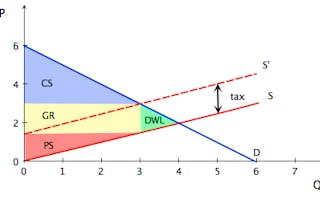The final module of the Power of Markets course begins by further exploring firm behavior in imperfectly competitive market settings: how firms with monopoly power can increase profits through price discrimination; and the price-output combinations we can expect firms to select in cases of monopolistic competition and oligopoly. We will also analyze monopolies from an efficiency perspective and look at the effects of imperfect information on firm and consumer behavior. We will next turn to exploring input markets and what determines the demand for an input by a firm, an industry, and the overall market. We will also look at the factors that affect input supply and how the supply of an input interacts with demand to determinant input prices. We will use input market theory to analyze institutions and government policies such as the NCAA sports cartel, the minimum wage, Social Security, and immigration. Finally, we will address the concept of market efficiency and what government can do to promote it as well as how government intervention may diminish it.

The Power of Markets III: Input Markets and Promoting Efficiency

The Power of Markets III: Input Markets and Promoting Efficiency

Instructor: Mark Zupan
5,644 already enrolled
Included with
42 reviews
What you'll learn
Students will be able to explain how firms function in a variety of competitive market situations.
Skills you'll gain
Details to know

Add to your LinkedIn profile
4 assignments
See how employees at top companies are mastering in-demand skills

There are 4 modules in this course
Price Discrimination. Firm Behavior in Cases of Monopolistic Competition and Oligopoly.
What's included
10 videos1 assignment
Imperfect Information. The Efficiency Effects of Monopoly. Firm, Industry, and Market Demand for an Input.
What's included
9 videos1 assignment
The Supply of Inputs and the Determination of Input Prices.
What's included
10 videos1 assignment
Using Input Market Theory to Analyze the Minimum Wage, Social Security,Immigration, and the NCAA. Promoting Market Efficiency and Why Government Intervention in Markets May be Justified.
What's included
10 videos1 assignment
Instructor

Offered by
Explore more from Business Essentials
 Status: Preview
Status: PreviewUniversity of Rochester
 Status: Preview
Status: PreviewUniversity of Rochester
 Status: Preview
Status: PreviewUniversity of Pennsylvania
 Status: Free Trial
Status: Free Trial
Why people choose Coursera for their career

Felipe M.

Jennifer J.

Larry W.

Chaitanya A.
Learner reviews
- 5 stars
88.09%
- 4 stars
9.52%
- 3 stars
2.38%
- 2 stars
0%
- 1 star
0%
Showing 3 of 42
Reviewed on Apr 18, 2017
The course that changes way of thinking. Thank you a lot for this.

Open new doors with Coursera Plus
Unlimited access to 10,000+ world-class courses, hands-on projects, and job-ready certificate programs - all included in your subscription
Advance your career with an online degree
Earn a degree from world-class universities - 100% online
Join over 3,400 global companies that choose Coursera for Business
Upskill your employees to excel in the digital economy
Frequently asked questions
To access the course materials, assignments and to earn a Certificate, you will need to purchase the Certificate experience when you enroll in a course. You can try a Free Trial instead, or apply for Financial Aid. The course may offer 'Full Course, No Certificate' instead. This option lets you see all course materials, submit required assessments, and get a final grade. This also means that you will not be able to purchase a Certificate experience.
When you purchase a Certificate you get access to all course materials, including graded assignments. Upon completing the course, your electronic Certificate will be added to your Accomplishments page - from there, you can print your Certificate or add it to your LinkedIn profile.
Yes. In select learning programs, you can apply for financial aid or a scholarship if you can’t afford the enrollment fee. If fin aid or scholarship is available for your learning program selection, you’ll find a link to apply on the description page.
More questions
Financial aid available,

